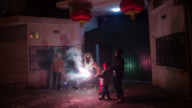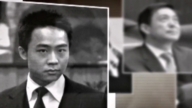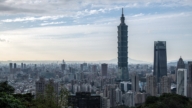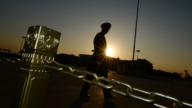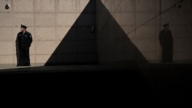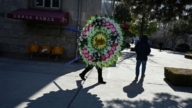【新唐人2012年10月23日讯】1500名中国游客乘坐大型邮轮“哥斯达维多利亚”号,20号下午抵达了日本熊本县的八代港,这是日本将钓鱼岛“国有化”后,中国大陆赴日旅游的最大规模旅行团。评论认为,这是“十八大”即将召开前,中日缓和的信号,同时体现美国支持习近平接班的态度。
由于钓鱼岛纷争,中日关系跌到四十年来的谷底,许多大陆旅行公司暂停或取消了日本游的行程,因此,1500名中国游客参加日本熊本县的烟火大会,被认为是中日缓和的信号。
北京时政观察人士华颇:“首先从国内来讲,中国和日本领导人都要换届,所以呢,钓鱼岛问题不可能导致中日关系破裂。中日双方领导层第一会表明强硬的立场,第二它会采取一些措施,逐步使事态得以平息,使双方的颜面都可以得到保全。”
华颇指出,除了国内因素在国际上也有因素促使钓鱼岛问题降温。
华颇:“主要来讲,起关键作用的美国,也不愿意中日关系因为钓鱼岛而一发不可收拾,所以美国在这方面,予以了降温。”
日本和美国原计划从11月5号—16号在冲绳县的无人岛举行联合“夺岛军事演习”,但日本《冲绳时报》20号说,两国政府正考虑取消这次军演。
由于中共“十八大”召开时间正好在美日军演预定期间,取消的消息对于将在“十八大”接班的习近平来说,无疑可以松一口气,因此也被认为是美国政府对于习近平接班做出的表态。
而《大纪元》新闻网9月报导,美国已经与习近平达成默契,支持他安全接班。报导说,美国政府一直对“周永康势力”反感,不愿意看到周永康势力主掌中国。美国看到钓鱼岛问题与中共权力交接之间的关联,因此在钓鱼岛问题上不会支持日本,美国的态度使得钓鱼岛问题会很快平复下来。
事实上,美国政府的这一态度在王立军叛逃时就有表露。当时正好是习近平访美期间,美国官员通过媒体透露,王立军向美国大使馆提供的材料中,包括薄熙来和周永康密谋计划整垮习近平,不让他顺利接班等内容。被外界形容是美国有意送给习近平的“一份大礼”。
在这样的国内和国际氛围下,10月11号,中共外交部亚洲司司长罗照辉应邀访问日本,会晤日本外务省官员,双方同意尽快举行副外长级会谈,寻求打破钓鱼台争议的僵局。官方动作9天后,1500人的中国旅行团抵达熊本,受到当地的热情欢迎,被视作民间寻求关系缓和的一步。
时事评论员汪北稷:“日本在这个事情上也确实做出了理性的一步,对中国人民施展它作为新兴的一个民主国家的一种姿态。区分了中共的统治阶层,和中国人民之间的不同。它没有把中国统治阶级所掀起来的反日情绪,看作是中国人民的普遍情绪。”
时事评论员汪北稷认为,钓鱼岛问题的解决将是建立在理性的协商之上。
汪北稷:“中共内部想把钓鱼岛纠纷,一些别的历史问题扩大化和复杂化的势力,他们诡计还是不能实现的。随着中共的解体,民主政治将来就要到来了,中日两国对历史问题的看法、对领土问题的看法、包括对钓鱼岛问题的看法,会更加趋于尊重两国的民意,尊重真正的历史。”
据了解,这批中国游客除了观赏20号在八代市举行的全日本烟火竞技大赛,还参观了阿苏山、熊本城等著名的景点,21号离开熊本,返航上海。
采访/刘惠 编辑/尚燕 后制/君卓
Strained Relations Easing: 1,500 Chinese Tourists Visit Japan
On October 20, a large cruise ship with 1,500 Chinese
tourists reached Yatsushiro in Kumamoto, Japan.
This was China’s largest group of tourists to visit Japan
since the country “nationalized” the Diaoyu Islands.
Commentators view it as a sign of Sino-Japanese
relations thawing, as the Chinese Communist Party (CCP)’s 18th Congress draws nearer.
Analysts also say that this shows the U.S.
is backing Xi Jinping to take the leadership.
The dispute over the Diaoyu Islands made Sino-Japanese
relations reach it’s lowest point in over 40 years.
Many Chinese travel agencies suspended
or canceled travel itineraries for Japan.
1,500 Chinese tourists traveled to Japan to view
the annual fireworks display hosted in Kumamoto.
This was deemed a sign of détente;
the easing of strained relations.
Hua Po, political observer in Beijing: “Both
countries currently face a leadership transition.
So, the Diaoyu Islands issue is unlikely
to destroy Sino-Japanese relations.
Initially, both sides took tough stances.
Next, they’ll take some measures to gradually
calm the situation, in order to save face.”
Hua Po adds that besides domestic factors, the international
community contributed to cooling the Diaoyu Islands issue.
Hua Po: “The U.S. played a key role on this.
It’s unwilling to see Sino-Japanese relations
get out of control because of the dispute over the Diaoyu Islands, and helped cool the conflict.”
A planned joint Japan-U.S. military drill will
take place between November 5 and 16 in Okinawa.
On October 20, the Okinawa Times reported
that both countries considered canceling the drill.
The CCP 18th Congress falls on the date
of the Japan-U.S. joint security drill.
News of a cancellation would relieve
Xi Jinping, the incoming CCP leader.
The news would also be viewed as a positive
U.S. stance on Xi Jinping taking power.
In September, the Epoch Times reported that
the U.S. had reached a verbal agreement with Xi Jinping to support his succession.
The report revealed that the U.S. government
has long disliked “the Zhou Yongkang forces”.
The U.S. has seen the relevance of the Diaoyu Islands
dispute to the power transition of the CCP.
Thus, it would not support Japan on the issue.
The Epoch Times predicted that this
U.S. attitude would soon quell the clash.
In fact, when Xi Jinping visited the U.S., after Wang Lijun
had fled to the U.S. consulate, the U.S. showed its stance.
Through the media, U.S. officials revealed information
about confidential evidence provided by Wang Lijun.
This included a military coup plot involving Bo Xilai and
Zhou Yongkang, to block Xi Jinping’s smooth succession.
The U.S. move was considered
“a great gift" given to Xi Jinping.
On October 11, Luo Zhaohui, Asian Affairs Director
of the CCP Foreign Ministry, was invited to visit Japan.
Both sides agreed to hold ministerial level talks to break
the impasse caused by the Diaoyu Islands dispute.
Nine days later, a tour group of 1,500 Chinese arrived
in Japan’s Kumamoto, and received a warm welcome.
The issue was viewed as a non-official step
to seek the easing of the strained relationship.
Critic Wang Beiji: “On this issue, Japan presented rationale,
and showed a stance as being an emerging democracy.
It distinguished the CCP ruling
echelon from the Chinese people.
It didn’t treat the anti-Japanese sentiment stirred up
by the CCP rulers as a general public mood in China.”
Wang Beiji forecasts that the Diaoyu Islands
dispute will be settled through rational negotiation.
Wang Beiji: “CCP internal factions intended to use the
Diaoyu Islands dispute as a chance to expand and complicate some other historical issues, but still failed.
As the disintegration of the CCP moves forward,
China’s democracy is just around the corner.
Considering the views that China and Japan will hold
on historical and territorial issues, which include the
Diaoyu Islands, I believe, they will reflect the will
of the people and respect the reality of history more.”
Reportedly, on October 20, the group of Chinese tourists
also visited local famous sights in Kumamoto.
The tour group returned to Shanghai the next day.



